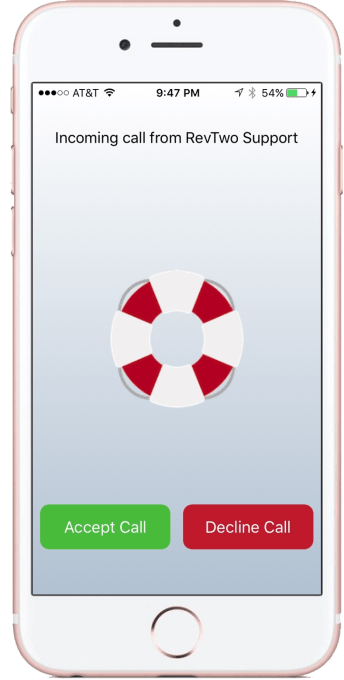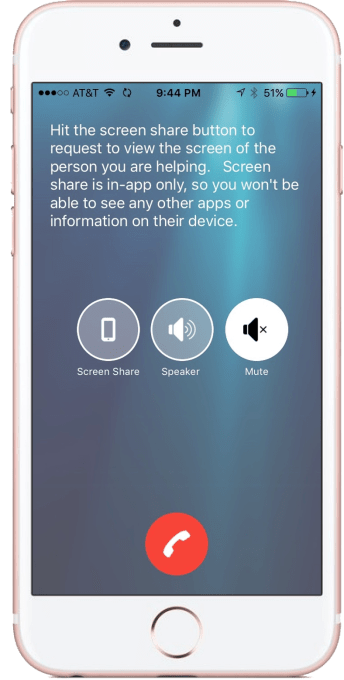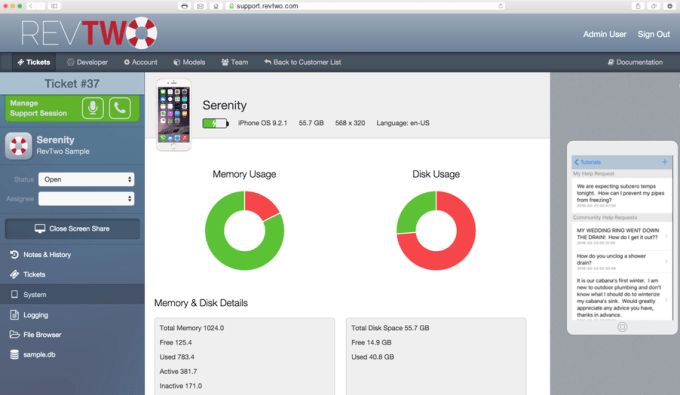What if mobile applications weren’t standalone, isolated experiences, but could actually connect users to each other – or even to the app’s developers – with a push of a button? That’s the vision behind a startup called RevTwo, exiting from stealth today. Its mobile app SDK for iOS lets developers offer a range of in-app support services for an app’s users which can include chat, phone calls, screen-sharing sessions, and more.
But another compelling use case for the software is allowing an app’s users to socialize and interact with each other.
For example, mobile gamers could share their screen in real-time with other players in order to show off their own game-playing sessions, or demonstrate how to beat a particular level.
Given the traction that Twitch already has in the e-sports market, it’s interesting to think about how watching others game live could be applied to the mobile app space through technology like this from RevTwo.
The startup, however, is currently touting its in-app support model, which reaches a potentially broader market beyond just mobile gaming.

The concept, at its core, is not entirely unlike Amazon’s Mayday feature – except one where developers aren’t just helping users, but also accessing log file data to help determine what may have triggered a given problem.
With Amazon’s offering, a Fire tablet user can push a button to receive help from a real person who can also help walk you through how to perform various functions on your device by either explaining it to you, drawing on your screen, or doing it for you remotely.
The startup’s software, on the other hand, lets apps open support sessions, initiate and respond to voice calls, and interact with diagnostic tools including screen sharing, logging, database inspector and file browser, the company says. It uses WebRTC technology in order to create fast peer-to-peer connections with devices.

But this core feature set is fairly flexible in terms of use cases.
Developers could use the SDK for in-app support – to save users from having to leave the app and scour the web for solutions, for example, or to prevent them from getting so frustrated they leave a one-star review on the App Store.
But it could also be used in a helpdesk environment with enterprise applications, or as a tool to help development teams actually see bugs and other issues with pre-release software in real-time, on a remote user’s screen.
In consumer-facing apps, it could be used to create a social community in the app where users could interact through chat, voice or screen-sharing sessions.
That makes sense in mobile gaming, but could also expand to a variety of consumer apps, including those in the edtech space. In the latter case, teachers or tutors could pop into a mobile application to guide a user through the problem that has them stumped, for example.
The company was co-founded by Dale Calder and Jim Hansen, previously founders at the early Internet of Things platform Axeda, which was acquired by PTC for $170 million in 2014. Calder’s daughter, Ashley, is also on board at the new company, serving as Director of User Experience.
Hansen explained that the founders started RevTwo because they saw firsthand how hard it was for developers to replicate problems in testing and in production.

However, Calder told us that the idea to use the SDK within mobile games was one prompted by watching his 16-year old son in action . He expects the company will have early adopters for its software in around a month’s time. A future release will support gamification elements where players could be rewarded with in-app points or virtual goods in a mobile for helping other users by sharing their own gaming sessions.
The company plans to monetize by charging at the enterprise level based on things like active help sessions, and other metrics, but will be a freemium product in order to encourage growth
“We want to bring community into the app world,” says Calder. “We want this in every app on the App Store.”
An Android version is also planned. In the meantime, interested developers can sign up on RevTwo’s website. The company claims the SDK can be integrated within 10 minutes’ time.
